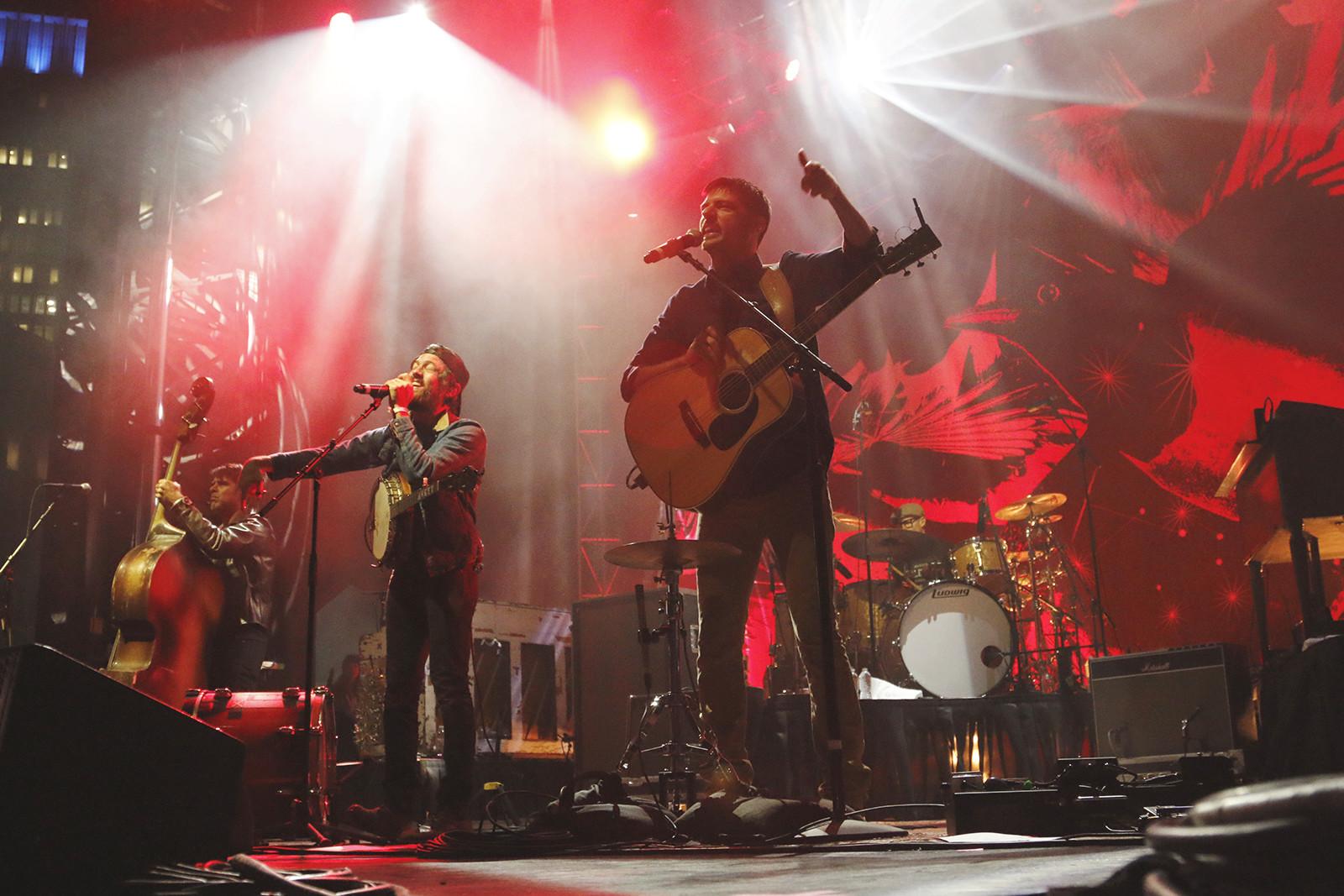[mediagrid cat=”22205″]
This weekend’s Boston Calling music festival opened with something of a whimper.
Just after 6 p.m. Friday, as dusk began to set in, South African singer-songwriter Gregory Alan Isakov took the JetBlue Stage at Boston’s City Hall Plaza in a tight-fitting hat and button-down jacket. His set was quiet, pleasant and rather unusual for the kickoff of the city’s largest music festival. This trend of defying expectations would continue throughout the weekend.
Isakov operated in earnest folk-country mode for the duration of his 35-minute set, never rising above a measured medium pace, and it made for a crowd that stood quietly, with soft head nods and wandering eyes. The crowd’s focus, however, clicked into place as soon as the large screens flanking the stage displayed two stenciled monograms reading “OMAM,” the official symbol for Icelandic outfit Of Monsters and Men.
Of Monsters and Men played away any remaining daylight, eliciting a number of glow sticks and screams from the increasingly packed crowd. Sonically, though, their pleasant brand of sunny, jangly pop rock failed to rise above a homogenous, inoffensive drone. The true stars of Friday night, in unsurprising fashion, were the headliners.
The Avett Brothers, a genre-bending folk-country band initially formed by North Carolinian brothers Seth and Scott Avett, commanded the expanse of Boston Calling’s festival space from the moment they stepped onstage. Rugged charm fully in tow, the pair brought the festival’s opening night to a raucous close. Laser-precise harmonies complemented gruff banjo plucks and stomping kick drums through to their encore performance of “Slight Figure of Speech.”
Saturday proved to be less consistent than Friday night. The day started off early, with the sun hung over the plaza at 1 p.m. The Allston-based Grey Season opened the day and their set was strong, starting with powerful a cappella harmonies that led into a clean rock sound. Their high-energy performance quickly attracted a significant crowd.
That afternoon continued with ups and downs. The unpolished electronic Skylar Spence and the out-of-place jam band Stephen Malkmus & The Jicks presented some inconsistency and lost the interest of a portion of the crowd. Doomtree came between those acts, though, and their aggressive hip-hop style picked up the energy.
Father John Misty came as an early highlight, bringing the experienced performance of a headlining act early at 5 p.m. to an eagerly receptive crowd.
The final performances of the day continued the pattern of varied success. Walk The Moon suffered from a subpar sound mix, but got the crowd moving nonetheless. Chromeo delivered a danceable, if slightly longer than ideal, set and Chvrches brought the peak of the evening with lead vocalist Lauren Mayberry’s lively performance. alt-J felt like an awkward end after Chvrches, however, producing a slow-moving set that paralleled the fading energy of the audience.
Sunday, overall, featured a much more consistent lineup. From the loose, soulful caffeine shot of Dirty Bangs’ sound down to the final caterwauls of Alabama Shakes’ Brittany Howard, there was seldom a dip in energy or musical talent.
Nashville alternative rockers Bully, styled somewhere between “In Utero” era Nirvana and latter-day Garbage, were an early highlight, with lead singer Alicia Bognanno’s trembling alto shredding through early-afternoon doldrums without a hitch. They led into an incredibly consistent set by British trio Daughter, whose atmospheric brand of poetic, down-tempo guitar-pop brought the house down early, with little fanfare.
The first set that seemed to truly incite audience excitement was fun. frontman Nate Ruess, who took to the festival’s Red Stage with an Art Deco backdrop and a neon pink piano. He delivered anthem after anthem, and the crowd sang along full-heartedly to his performance of his band’s hit “Carry On.”
From that point on, Hozier and Alabama Shakes captured the audience devotion that Ruess summoned and strengthened it respectively with their soulful final acts. Hozier’s modern blues felt like the reason that much of the crowd was there that day, and Alabama Shakes’ Howard never faltered once in her expressive and spot-on 90-minute, festival-closing performance.
Although Boston Calling started with a whimper, it ended with a bang. Sunday’s solid lineup brought to a close the overall impressively substantial three-day celebration of modern music.

























































































































